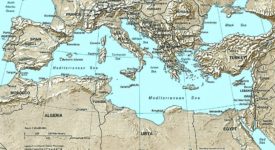The interest of the international community in the Sahel region has increased significantly in recent years. The rise of global terrorism and the migration crisis have attracted attention to this impoverished African region. However, global response and regional efforts still remain inadequate and insufficient to resolve the many crises affecting the region. Corruption and informal economy still overpower the rule of law and governance, while the focus on reducing migration by the European Union damages communities and undermines regional populations. As a result, the pressure from Brussels fails to address the root causes behind migration.
Observers overall agree that regional stabilization must be achieved holistically, taking into account security capacity and coordination while also stressing the need for greater regional integration between the Sahel and North Africa. This would curb the appeal of operating in the informal economy and at the same time provide opportunities for legal work in the region. The formalization of some previously clandestine economic activity could boost development and economic diversification while creating jobs.
To accomplish these goals, the French and international efforts to strengthen intra-Sahel and Sahel-Maghreb integration focus on migration, economic reform, security coordination, and regional institutional frameworks. To address migration, the EU should help the region’s countries create a joint migration framework for the Sahel, West Africa and the Maghreb. Europe should further help to regularize and legalize population flows while providing regional and financial assistance to economic projects. Moreover, the EU should try to find ways to keep a leeway for legal migration to Europe and thus take stress off of regional communities.
Similarly, regional economic reform also requires combined approach to migration and informal economies that involve the Sahel and the Maghreb while also encouraging investment by regional and foreign countries. Security should involve long-term focus that goes beyond training for troops as well as a better integration of security and governance initiatives to make security durable and sustainable. Finally, to strengthen regional institutions and governance, the EU should help harmonize and coordinate the region’s bodies and help reduce dependence on international support.
The Sahel remains one of the world’s poorest regions. It is struck by a combination of rapid population growth, food insecurity climate change and crime and terrorism. Due to the complexity of the region’s reality, the Sahel countries are failing to develop coordinated approaches. Although the international community has boosted its presence in the region since 2012 when the jihadists took over northern Mali, the sad reality is that insecurity has been on rise ever since, fed by smuggling networks and corruption.
‘Bringing the Desert Together: How to Advance Sahel-Maghreb Integration’ – Policy Brief by Andrew Lebovich – European Council on Foreign Relations (ECFR).







